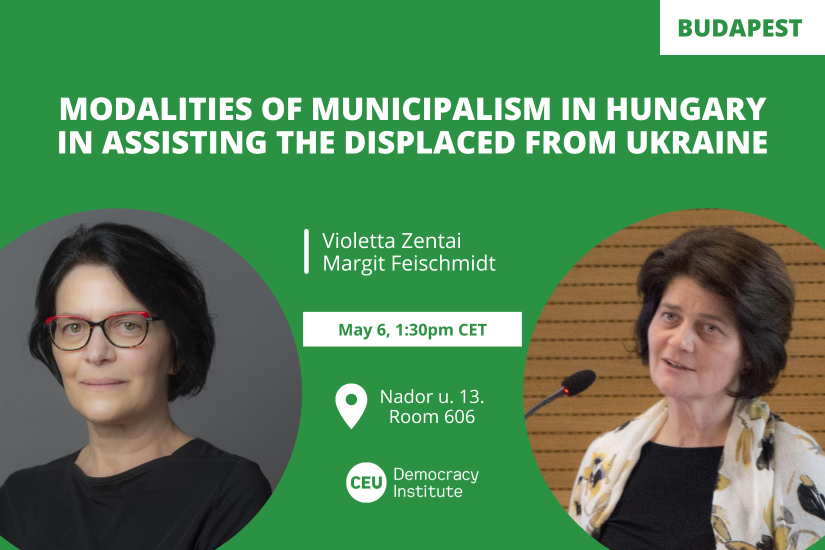
The Inequalities and Democracy Workgroup of the CEU Democracy Institute cordially invites you to its public seminar. You can check our past events here.
If you would like to attend, please register here.
Please keep in mind that external guests will not be able to enter the building without prior registration.
The seminar starts with a 25-minute paper presentation followed by comments from the discussant. Discussion open to the audience follows. To actively take part in the discussion, please read the draft paper beforehand. The paper is available upon request from the authors.
Abstract:
The chapter explores how civic and municipal actors have reassembled material, human, and institutional resources to respond to a situation of urgency generated by the war against Ukraine and the subsequent arrival of displaced people to Hungary. We examine local actors’ coalitions that have built different degrees of resilience to an authoritarian state regime and its social policy paradigms or capitalized on these conditions without resilience. Harvesting our layered qualitative research, we propose a scheme of modalities of municipalism enacted in the observed refugee solidarity operations. Variations are explained by the intersections of vertical and horizontal institutional conditions of solidarity practices, the nexus of main actors and their resources, extant experiences in inclusion spirited advocacy and governance, and the shape of local society. While enduring practices of solidarity for the Ukrainian refugees have largely remained an urban phenomenon in Hungary, small-town and village initiatives have played a way more salient role in addressing the current crisis than in 2015. Beyond the urban responses, the discussion of rural forms of municipal refugee solidarity will make an important part of our contribution.
Speakers:
Violetta Zentai is a cultural anthropologist with a PhD from Rutgers University (USA). She was co-director of the Center for Policy Studies at the CEU (2003-2020). She joined the Democracy Institute of the CEU based in Budapest in 2020. She is also faculty member of the Department of Public Policy and visiting faculty at the Department of Sociology and Social Anthropology of the CEU. She was one of the faculty members designing and launching public policy MA level teaching at the CEU. She is engaged in research focusing on ethnic and gender inequalities, European equality policies, and debates on post-socialist capitalisms and social exclusion/inclusion.
Margit Feischmidt is research professor at Centre for Social Sciences, Hungarian Academy of Sciences Centre of Excellence where she leads the Department for Sociology and Anthropology in Minority Studies. She is visiting professor at the Nationalism Studies Program at CEU. She is also editor in chief of Intersections. East European Journal of Society and Politics and teaches as full professor at Institute for Communication and Media Studies, University of Pécs. With a doctoral degree from Humboldt University and habilitation from her home university she works on issues of migration, nationalism, ethnicity and minorities in East-Central Europe and generally.
Discussant:
Zsuzsanna Árendás is a Research Affiliate at the CEU Democracy Institute and a Research Fellow at the Institute of Sociology at the Center for Social Sciences. Her research focuses on various aspects of human mobilities in a transnational space in relation to the reproduction of social inequalities- including social and political enactments of citizenship, social integration of immigrants, migrant vulnerabilities, and various aspects of return migration. In her recent work, she explores youth and child mobilities. In the context of social inequalities, Zsuzsanna’s research also centers around the sociological aspects of labour relations, the employment of Roma with high educational qualifications, and the diversity management and its potential in the inclusion of Roma workforce in Central and Eastern Europe.
Chair:
Andrea Krizsan is Senior Research Fellow at the Democracy Institute and Professor at the Department of Public Policy and the Gender Studies Department. She works on the politics of inequalities and equality policy interventions in countries of Central and Eastern Europe. Her current research focuses on gender equality aspects of de-democratization processes and the role of civil society in building democratic resilience and inclusive democratization processes. Besides her academic work Andrea also acts as the Chair of the CEU Senate Equal Opportunity Committee. Andrea has a PhD in Political Science from the Central European University.